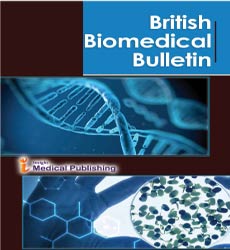ISSN : 2347-5447
British Biomedical Bulletin
Guidelines for Disclosing Clinical Trials Involving Biofield Therapies
Chen Chaix*
Department of Biomedical Research, University School of Medicine, Baltimore, USA
- *Corresponding Author:
- Chen Chaix
Department of Biomedical Research,
University School of Medicine, Baltimore,
USA,
E-mail: Chaix_C@gmail.com
Received date: February 13, 2024, Manuscript No. IPBBB-24-18799; Editor assigned date: February 16, 2024, PreQC No. IPBBB-24-18799 (PQ); Reviewed date: March 01, 2024, QC No. IPBBB-24-18799; Revised date: March 08, 2024, Manuscript No. IPBBB-24-18799 (R); Published date: March 15, 2024, DOI: 10.36648/2347-5447.12.1.36
Citation: Chaix C (2024) Guidelines for Disclosing Clinical Trials Involving Biofield Therapies. Br Biomed Bull Vol.12 No.1: 36.
Description
Guidelines have been developed to improve the reporting standards for clinical trials investigating biofield therapies. Systematic reviews of studies within this realm of integrative health practices have highlighted the importance of increased transparency in reporting trial outcomes. These guidelines, named Biofield Therapies: Reporting Evidence Guidelines (BiFi: REGs), serve as a supplement to the 2010 guidelines, focusing specifically on intervention protocols relevant to biofield therapy trials. The development of BiFi REGs involved a collaborative effort, starting with a draft document crafted by a core group. This draft underwent refinement through two rounds of a Delphi process, involving input from an international panel of subject matter experts. Additionally, two panel meetings conducted via Zoom, which included editors from complementary and integrative medicine journals, further refined the guidelines.
Clinical trials
Clinical trials represent a multifaceted endeavor, demanding substantial resources and meticulous attention to detail to yield valid and valuable outcomes. However, the investment pales in comparison to the wealth of evidence generated, which subsequently enhances medical practice and public health. Notably, there has been a remarkable surge in the number, scale and breadth of clinical trials in recent years. This exponential growth can be attributed to the escalating reliance on evidencebased decision-making and the burgeoning array of new treatments necessitating thorough validation. To sustain this momentum, there is a pressing need to expand and diversify participant recruitment while concurrently enhancing efficiency. It is imperative to develop trial designs that optimize efficiency without compromising scientific integrity or introducing biases. Adaptive designs, for instance, are gaining traction as they permit adjustments to sample size or outcomes during the course of the trial. Crucially, such adaptations must be overseen by impartial monitors to prevent sponsors or investigators from manipulating the study to yield biased results. Enhancing public trust is paramount for garnering support for clinical trials. Comprehensive registration and transparent reporting of all trials serve to prevent study duplication, enhance scientific scrutiny, elevate quality standards and underscore their significance in bolstering public health and medical care. In summary, clinical trials are intricate endeavors with vast potential to drive medical advancements and improve patient outcomes. By adopting innovative methodologies, ensuring transparency and fostering public trust, we can further fortify the foundation of evidence-based medicine and propel healthcare forward.
Therapeutic strategies
Therapeutic Touch (TT) is a technique that involves manipulating the body's energy field by passing hands over the body without direct contact, aiming to rebalance energy and facilitate innate healing processes. An early study, supported by the office of alternative medicine at the National Institutes of Health (NIH), investigated the effects of TT on 20 highly stressed nursing and medical students preparing. These students were randomly assigned to either receive TT or not. The study observed significant differences between the groups in markers such as IgA, IgM and apoptosis, indicating alterations in the immune response. However, further theoretical development is necessary to fully elucidate how stress-reducing therapies, like TT, induce such immune response changes. Therapeutic strategies for addressing pre-invasive cervical disease aim at halting lesion progression and achieving local control. Imiquimod, a pharmacological agent, has been utilized to treat low-grade lesions, albeit with varying outcomes reported in studies. Surgical interventions encompass both destructive and excisional techniques. These procedures typically yield a success rate of approximately 90%. Currently, the loop electrosurgical excision procedure is the prevailing excisional technique, necessitating a thorough colposcopic examination to ensure complete lesion removal. Treatment options for Vulvar Intraepithelial Neoplasia (VIN) include both pharmacological and surgical approaches. Presently, surgery remains the primary choice for eradicating VIN and achieving complete lesion elimination. Surgical modalities encompass both destructive and excisional techniques, with no significant disparities noted among these methods.
Open Access Journals
- Aquaculture & Veterinary Science
- Chemistry & Chemical Sciences
- Clinical Sciences
- Engineering
- General Science
- Genetics & Molecular Biology
- Health Care & Nursing
- Immunology & Microbiology
- Materials Science
- Mathematics & Physics
- Medical Sciences
- Neurology & Psychiatry
- Oncology & Cancer Science
- Pharmaceutical Sciences
